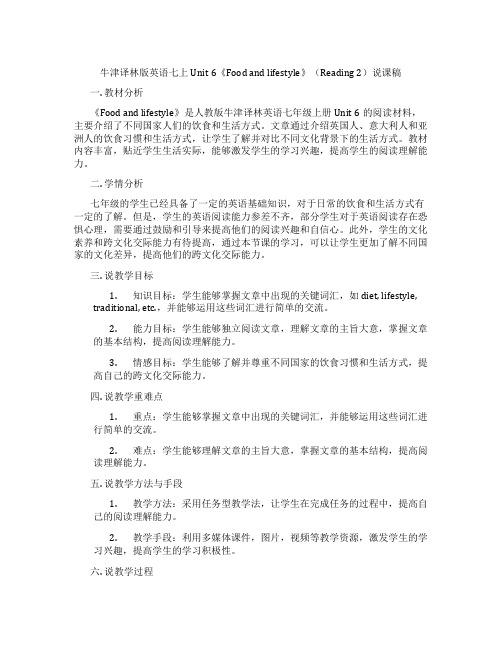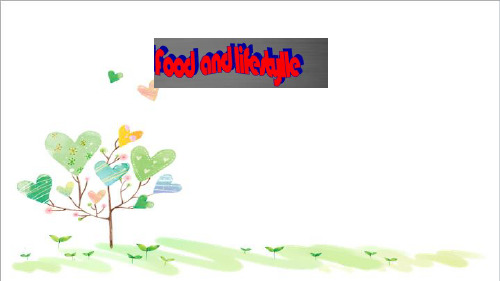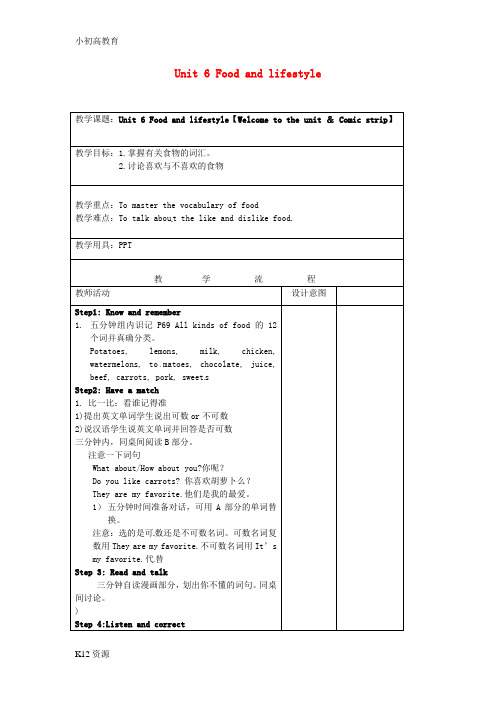七年级英语上册Unit 6 Food and lifestyles Welcome to this unit 教案 新版牛津版
【小初高学习】七年级英语上册 Unit 6 Food and lifestyle Integrate

Unit6Period 4 Integrated skills & Study skillsⅠ.短语翻译1.少于、不到________________________2.超过、多于________________________3.步行去上学 ________________________4.一点也不健康 ________________________5.多锻炼 ________________________ 6.少看电视 ________________________ 7.不再 ________________________ 8.吃很多的水果 ________________________ 9.散步 ________________________ 10.一听可乐 ________________________ Ⅱ.用所词的适当形式填空1.I don't know how ________(keep) fit.2.He ________(sleep) for more than 10 hours every night.3.I like ________(eat) sweets but I don't like them now.4.Millie dislikes ________(watch) football matches on TV.5.My partner spends about half an hour ________(exercise) every morning.6.How often ________ you ________(write) to your parents?7.He needs ________(see) a doctor.8.The food tastes________(good) and we all like it..9.The number of the students in our class _______(be) 3 thousand.10.It is important ________(have) a healthy meal every day.Ⅲ.根据句意及汉语提示,写出下列单词1.Mum buys three_______(公斤) of potatoes..2.I watch TV _________ (少于)than 2 hours a day.3.Eddie likes __________(饼干) very much.4.He spends half an hour __________(躺) on the couch after dinner.5.He gets 90__________(分数) in this exam.2.You'll be fat if you don't do morning __________ in the morning.3.My uncle likes __________ to school every day.4.Daniel is a football fan. He__________ watching and playing football.5.I __________ vegetables and meat. I don't want to eat them every day.6.Can I eat some __________ and rice for lunch, Mum?7.—What is your favourite fruit?—I like __________ best.8.Susan __________ eggs and she never eats them.Ⅵ.对画线部分提问1.It is five_minutes'_walk from the school.__________ __________is it from the school?2.There is only_a_little milk in the glass.__________ __________ __________ is there in the glass?3.I have only_one sister.__________ __________ __________ do you have?4.His grandfather is about_ninety_years_old.__________ __________ is his grandfather?5.The teacher goes to Shanghai twice_a_year.__________ __________ does the teacher go to Shanghai?6.I spend three_hours watching TV every day.__________ __________ ho urs do you spend watching TV every day?Ⅶ.根据汉语意思完成下列句子1.我们需要买些蔬菜吗?Do we __________ __________ __________ __________vegetables?2.喝绿茶对我们的健康有好处。
七年级英语上册Unit6FoodandlifestyleWelcometotheunit新版牛津版

Fruits bananas
apples
oranges pears
pumpkins
Vegetables
carrots
Drinks
milk water juice
chocolates
candies
snacks
ice creams
cakes hamburgers
mooncakes bread
Hamburgers
and meat.
never
never
eats carrots
eats hamburgers
Is he a healthy pet?
Why or Why not?
It’s noon, Hobo.Let’s
have a hamburger.
And hamburgers are not good for us. Let’s eat apples.
Put the food into the correct groups. Vegetables: potatoes, tomatoes, carrots… Fruits: lemons, watermelons meat: chicken,பைடு நூலகம்beef, pork…… drinks: milk, juice…… snacks: chocolate, sweets ……
Millie likes _b_a_n_a_n_a_s__, _c_a_rr_o_t_s __ and f_is_h_____. She dislikes _e_g_g_s__. Daniel likes _h_a_m_b_u_r_g_e_rs_. He likes ___e_g_gs____. He dislikes _c_a_r_ro_t_s_ .
牛津译林版英语七上Unit6《Foodandlifestyle》(Reading2)说课稿

牛津译林版英语七上Unit 6《Food and lifestyle》(Reading 2)说课稿一. 教材分析《Food and lifestyle》是人教版牛津译林英语七年级上册Unit 6的阅读材料,主要介绍了不同国家人们的饮食和生活方式。
文章通过介绍英国人、意大利人和亚洲人的饮食习惯和生活方式,让学生了解并对比不同文化背景下的生活方式。
教材内容丰富,贴近学生生活实际,能够激发学生的学习兴趣,提高学生的阅读理解能力。
二. 学情分析七年级的学生已经具备了一定的英语基础知识,对于日常的饮食和生活方式有一定的了解。
但是,学生的英语阅读能力参差不齐,部分学生对于英语阅读存在恐惧心理,需要通过鼓励和引导来提高他们的阅读兴趣和自信心。
此外,学生的文化素养和跨文化交际能力有待提高,通过本节课的学习,可以让学生更加了解不同国家的文化差异,提高他们的跨文化交际能力。
三. 说教学目标1.知识目标:学生能够掌握文章中出现的关键词汇,如diet, lifestyle,traditional, etc.,并能够运用这些词汇进行简单的交流。
2.能力目标:学生能够独立阅读文章,理解文章的主旨大意,掌握文章的基本结构,提高阅读理解能力。
3.情感目标:学生能够了解并尊重不同国家的饮食习惯和生活方式,提高自己的跨文化交际能力。
四. 说教学重难点1.重点:学生能够掌握文章中出现的关键词汇,并能够运用这些词汇进行简单的交流。
2.难点:学生能够理解文章的主旨大意,掌握文章的基本结构,提高阅读理解能力。
五. 说教学方法与手段1.教学方法:采用任务型教学法,让学生在完成任务的过程中,提高自己的阅读理解能力。
2.教学手段:利用多媒体课件,图片,视频等教学资源,激发学生的学习兴趣,提高学生的学习积极性。
六. 说教学过程1.Pre-reading:教师通过展示不同国家的饮食习惯和生活方式的图片,引导学生谈论自己的饮食和生活方式,激发学生的学习兴趣。
初中七年级英语上册 Unit 6《Food and lifestyle Welcome to the unit》1

fruit:
applge,e foirsahn,gec,hleicmkoenn,m,baenegof,pork
meat:
mooncake,chocolat
sweet scnoakcek,s:me,iclka,kjeuice
请动脑想想下列知识点,好吗?
1、如对never等表示频率的副词提问,用_______;对 m2a、nyWthimate/sHaowdaayb/owuet_ek_提__问_呢(do_)_s_th_h?_o_w做h_o某o_wf_事t_eo怎_fn么te样n ? What/How about ___d_o_in_g(watch)TV?
5、chicken“鸡肉”是不_可_数_______名词, “小鸡”是可火_数_鸡_肉___不_可名数词;。火鸡 可数
turkey呢?___m_a__n_g_o_e_s_________t_o_matoes 6、芒果的p复o数ta_t_o_e_s_____西红柿h的er复o数es______ 土豆的复数_p_h_o_t_o_s_ 英雄的复数_r_a_d_i_o_s_____
A having B have
C to having D to have
( D)4、Carrot is my _______________.
A like B hobby
C enjoy
D favourite
( )5、I have _______red packets and there
D ____ money in them.
3、蔬菜一般都以_复__数___形式出现。写v成eg_e_t_ab_l_e_s 饮料一般都以_复__数____形式出现。写成dr_i_nk_s____ 零食一般都以_复__数____形式出现。写成sn_ac_k_s____
【小初高学习】七年级英语上册 Unit 6 Food and lifestyle Welcome t

Unit 6 Food and lifestyle To talk abou t the like and dislike food.to matoes,beef, carrots, pork, sweet s注意:选的是可数还是不可数名词。
可数名词复代替听录音并跟读纠正你的读音。
Step 5:Listen and imitate.(T:.Listen to the conversation carefully and then read after the tape.)Step6:Translate1.翻译一下重要短语It’ s only half past ten. 只有十点半。
Hamburgers are not good for us. = Hamburgers are bad for us.汉堡对我们不好。
It is good for our health.这对我们的健康有好处。
An apple a day keeps the doctor away.一天一个苹果,医生远离我。
2.拓展:be good for 对。
又好处be good to…对…友好反义短语 be bad to 对…不好be good at…擅长,在……方面做得好be bad at…在……方面做得不好他的同班同学对他友好。
________________________________________她擅长跳舞。
_____________________________________他们不擅长数学。
______________________________________ Step7 Practice in class一.根据汉语及首字母提示完成下列句子。
1.We have lunch at n_____________.2.The doctor teaches him how to k__________healthy.3.Most children like eating____________(巧克力).4.They often give us some ______________(糖果)as a treat.5.You’d better eat less__________(肉) insummer.6.Rabbits like eating c_____________. Eats likeeating f_____________.7.Vegetables and fruits are good for yourh___________________.8.What about ___________(跳舞)?9.P____________ and t______________ are myfavorite vegetables.(蔬菜)10.Shall we have a h______________?。
牛津译林版七年级英语上册 Unit 6 Food and lifestyle 笔记

Unit 6 Food and lifestyle (生活方式)Welcome2. Fish is good for our health.鱼肉对我们的身体有益。
对...有益/有害be good for/be bad forhealth n.身体/健康;adj. healthy-unhealthy3. Hamburgers are not good for us.= Hamburgers are bad for us.4. An apple a day keeps the doctor away .一天一苹果,医生远离我。
ReadingWhat we eat and how we live 我们吃什么以及如何生活 (Food and lifestyle )Kitty1. 健康的事物对我很重要。
Healthy food is important for me.= It ’s important for me to have healthy food.(It ’s + adj. + for sb+ to do sth 对某人而言做某事怎么样) 3. I always have milk and bread for breakfast. For lunch and dinner , I usually eatfish and vegetables. 我经常早饭喝牛奶吃面包。
午饭和晚饭,我通常吃鱼肉和蔬菜。
4. Sometimes I feel hungry between meals .有时候我在两餐之间感觉饿。
5. I seldom eat cakes or sweets.我几乎不吃蛋糕和糖。
seldom 表示否定,原句and 变成or6. They have too much sugar and are bad for my teeth.他们含有太多糖分,并且对我的牙齿有害。
Daniel1.I like playing computer games.我喜欢玩电脑游戏。
七年级英语上 unit 6 Food and lifestyle welcome to the unit

Chinese New Year dumplings
Thanksgiving Day
turkey
What are these?
bananas peaches
apples
grapes
oranges
pears
pork /ɔː/
sweets / i:/
Po t a t o es /ə/ /eɪ/ /əʊ/
Like Dislike
oranges vegetables cakes
What food do you like or dislike? Work in pairs, Let’s make a dialogue!
A: I like\don’t like\dislike …Do you like…? B: Yes/No. Because … is/are good/bad for our health. What/How about you? A: I like/dislike ….Because…is/are good/bad for our ….
Read
Does Eddie have a healthy diet?
How can Eddie become healthy?
Tips: • Do more exercise. • Eat healthy diets and don’t eat
too much food.
milk eggs
carrots /æ/ /ə/
lemons /e/ /ə/
milk
/ɪ/
tomat oes /ə/ /ɑ://əʊ/
chocolate /ɒ/ /ə/
juice /u:/
beef
七年级英语上册《Unit 6 Food and lifestyles Welcome to this unit》教案 (新版)牛津版

《Unit 6 Food and lifestyles Welcome to this unit》教案Teaching Goals·A)To learn new vocabulary about food: hamburger, vegetable, carrotB)·To talk about likes and dislikes with regard to food:What food do you like? I like hamburgers.Do you like carrots? No, I don’t like/dislike/hate them. What about fish?Teaching Proced uresStep 1: Warm-up activityWrite new words in the blackboard.Give Ss five questions about the daily diet and ask them to answer them as soon as possible. Do you know what I ate this morning? (S guessing…) Oh, I have eaten milk and egg because they can give me more energy.2. Ask students to name as much food as possible in English and write them on the blackboardand group them. (Teachers can ask the following questions:)a.What food do you have for breakfast/lunch/supper?b.What food do you like? Why?c.What food do you dislike? Why not?d.What food is good for us?e.What food is bad for us?f.What Chinese food do you know?g.What Western food do you know?h..Do you like Chinese food or Western food? Why?Step 2: Presentationgroups the food and let Ss say the names of them together.2.Group Discussion: Divide Ss into groups and discussa.‘What is your favourite food/meat/ drink/vegetables?’b.‘ Why do you love/ like them?’3.Discuss about ‘What food you dislike/ hate?’ and ‘ Why do you dislike/ hate them?’ Examples:T: What food do you love/like?/ What is your f avourite food?S: I love/ like ….T: What food do you dislike/ hate?S: I dislike/ hate ….Step 3: Practice1. Ask students to write the food they like or dislike in the table of Part A2. Ask students to make up a conversation, use the one in Part B as an exampleA: I like bananas. What food do yo u like?B: I like hamburgers.A: Do you like carrots? They are my favourite.B: No, I dislike them. What about fish?A: I like fish. It is healthy. I don’t like eggs. What about you?B: I hate eggs.3. Ask a few pairs of students to r ole-play the conversation in front of the class.4. Ask students to talk about their family as well, e.g., My sister loves ice cream. My fatherhates chocolate.Step 4: Presentation①pair work:A: What do you usually eat for breakfast/ lunch/ supper?B: I usually eat…. for breakfast/ lunch/ s upper.A: What food do you like/ love?B: I love / like…A: What food do you dislike/ hate?B: I dislike/ hate…\② Report time: Ask students to make reports what they o r their partners like or dislike to theclass.Step 5: Listen and answer1.What’ll Eddie eat for lunch? (a hamburger)2.Is he always hungry?( Yes)3.Why?(He needs a lot of energy.)4.Does he often do some exercise/ exercise?(never)5.Why does he need a lot of energy? (He walks to his bowl many times a day.)6.What do you think of Eddie? (He’s lazy and likes eating.)7.Is he healthy?Step 6: Act outAsk students to role-play the conversationStep 7: DiscussionAsk students to discuss how to be a healthy person according to Comic strip. ( exercise m ore and eat healthy food, etc.)Step 8: SummaryT: In this period, we have learned about the names of some food and talked aboutwhat food we like and dislike. We also learned a comic strip which showed us themain points of this unit.Step 9: Consolidation exercises句型转换1.The little boy is very hungry now. (改为一般疑问句)2.It’s lunchtime.(写出两个同义句)3.She needs two oranges.(对划线部分提问)4.Eddie walks to his bowl many times a day.(同上)Answers: 1. Is the little boy very hungry now?2. It’s time for lu nch./ It’s time to have lunch.3. What does she need?4. How often does Eddie walk to his bowl?Step 10: HomeworkOral work: Revise this period, listen, repeat and recite Comic stripRecite the new words, phrases and sentence patterns.Preview reading必做题:词汇1.中午2.柠檬3.牛肉4.猪肉5.健康6.胡萝卜7.零食8.糖果9.巧克力 10.保持 11.肉 12.生活方式翻译词组1. 吃一个汉堡2. 对我们有益3. 十点半4. 给我十个苹果5. 各种各样的食品选做题完成对话(每空一词)It’s n . Hobo and Eddie are talking about what to eat. Eddie would like to have a h_______ ____. But Hobo thinks hamburgers are not g __________ for our health, and that Eddie shouldhave an a ,Because an apple a day k the doctor away . Eddie agrees(同意), but he needs t . Do you think that he can eat ten apples for just one meal? No, I don’t think so. I think we should make a h diet for Eddie. And we should have healthy l .。
- 1、下载文档前请自行甄别文档内容的完整性,平台不提供额外的编辑、内容补充、找答案等附加服务。
- 2、"仅部分预览"的文档,不可在线预览部分如存在完整性等问题,可反馈申请退款(可完整预览的文档不适用该条件!)。
- 3、如文档侵犯您的权益,请联系客服反馈,我们会尽快为您处理(人工客服工作时间:9:00-18:30)。
《Unit 6 Food and lifestyles Welcome to this unit》教案Teaching Goals·A)To learn new vocabulary about food: hamburger, vegetable, carrotB)·To talk about likes and dislikes with regard to food:What food do you like? I like hamburgers.Do you like carrots? No, I don’t like/dislike/hate them. What about fish?Teaching Proced uresStep 1: Warm-up activityWrite new words in the blackboard.Give Ss five questions about the daily diet and ask them to answer them as soon as possible. Do you know what I ate this morning? (S guessing…) Oh, I have eaten milk and egg because they can give me more energy.2. Ask students to name as much food as possible in English and write them on the blackboardand group them. (Teachers can ask the following questions:)a.What food do you have for breakfast/lunch/supper?b.What food do you like? Why?c.What food do you dislike? Why not?d.What food is good for us?e.What food is bad for us?f.What Chinese food do you know?g.What Western food do you know?h..Do you like Chinese food or Western food? Why?Step 2: Presentationgroups the food and let Ss say the names of them together.2.Group Discussion: Divide Ss into groups and discussa.‘What is your favourite food/meat/ drink/vegetables?’b.‘ Why do you love/ like them?’3.Discuss about ‘What food you dislike/ hate?’ and ‘ Why do you dislike/ hate them?’ Examples:T: What food do you love/like?/ What is your f avourite food?S: I love/ like ….T: What food do you dislike/ hate?S: I dislike/ hate ….Step 3: Practice1. Ask students to write the food they like or dislike in the table of Part A2. Ask students to make up a conversation, use the one in Part B as an exampleA: I like bananas. What food do yo u like?B: I like hamburgers.A: Do you like carrots? They are my favourite.B: No, I dislike them. What about fish?A: I like fish. It is healthy. I don’t like eggs. What about you?B: I hate eggs.3. Ask a few pairs of students to r ole-play the conversation in front of the class.4. Ask students to talk about their family as well, e.g., My sister loves ice cream. My fatherhates chocolate.Step 4: Presentation①pair work:A: What do you usually eat for breakfast/ lunch/ supper?B: I usually eat…. for breakfast/ lunch/ s upper.A: What food do you like/ love?B: I love / like…A: What food do you dislike/ hate?B: I dislike/ hate…\② Report time: Ask students to make reports what they o r their partners like or dislike to theclass.Step 5: Listen and answer1.What’ll Eddie eat for lunch? (a hamburger)2.Is he always hungry?( Yes)3.Why?(He needs a lot of energy.)4.Does he often do some exercise/ exercise?(never)5.Why does he need a lot of energy? (He walks to his bowl many times a day.)6.What do you think of Eddie? (He’s lazy and likes eating.)7.Is he healthy?Step 6: Act outAsk students to role-play the conversationStep 7: DiscussionAsk students to discuss how to be a healthy person according to Comic strip. ( exercise m ore and eat healthy food, etc.)Step 8: SummaryT: In this period, we have learned about the names of some food and talked aboutwhat food we like and dislike. We also learned a comic strip which showed us themain points of this unit.Step 9: Consolidation exercises句型转换1.The little boy is very hungry now. (改为一般疑问句)2.It’s lunchtime.(写出两个同义句)3.She needs two oranges.(对划线部分提问)4.Eddie walks to his bowl many times a day.(同上)Answers: 1. Is the little boy very hungry now?2. It’s time for lu nch./ It’s time to have lunch.3. What does she need?4. How often does Eddie walk to his bowl?Step 10: HomeworkOral work: Revise this period, listen, repeat and recite Comic stripRecite the new words, phrases and sentence patterns.Preview reading必做题:词汇1.中午2.柠檬3.牛肉4.猪肉5.健康6.胡萝卜7.零食8.糖果9.巧克力 10.保持 11.肉 12.生活方式翻译词组1. 吃一个汉堡2. 对我们有益3. 十点半4. 给我十个苹果5. 各种各样的食品选做题完成对话(每空一词)It’s n . Hobo and Eddie are talking about what to eat. Eddie would like to have a h_______ ____. But Hobo thinks hamburgers are not g __________ for our health, and that Eddie shouldhave an a ,Because an apple a day k the doctor away . Eddie agrees(同意), but he needs t . Do you think that he can eat ten apples for just one meal? No, I don’t think so. I think we should make a h diet for Eddie. And we should have healthy l .。
